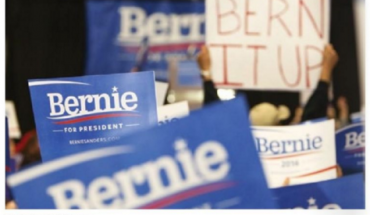Bernie Sanders Wins Michigan Where Marijuana Matters

By Chris Goldstein
Bernie Sanders won the Michigan primary yesterday in a state that could vote on legalizing marijuana on the same ballot as the presidential contest this fall.
Sanders pulled through by a narrow margin; 50% to Hillary Clinton’s 48%, but he overcame a 20 point defect in polling leading up to the primary. The come-from-behind victory is what has political analysts buzzing today.
The group MILegalize is gathering signatures for a ballot initiative that would be a comprehensive change for marijuana in the Wolverine State. Their plan, of course, would tax and regulate retail cannabis sales but would also fully decriminalize possession and end civil asset forfeiture.
Matt Abel is a Detroit area attorney who serves on Michigan NORML’s Board of Directors and is running the MILegalize effort. Abel says they have spent more than $600,000 in their push to reach a 253,000 signature requirement by June 1st.
State legislators in Lansing have also filed bills to legalize cannabis as well. Polling shows that 56% of voters back the shift.
So, clearly, one factor that MI voters had to consider yesterday was a major difference between Sanders and Clinton are their positions regarding marijuana laws.
Clinton has backed downgrading cannabis from Schedule I to Schedule II in the federal Controlled Substances Act (CSA).
NORML’s Deputy Director and Freedom Leaf Policy Director Paul Armentano argued that approach just isn’t enough.
Armentano outlined the problems with Clinton’s position in an article on AlterNet:
In short, Clinton’s presumption that it is the absence of scientific research that necessitates the need to remove cannabis from Schedule I is both ill informed and unpersuasive. In truth, marijuana does not belong in Schedule I because ample scientific evidence already exists disproving the government’s claim that it is among the most dangerous substances known to man and that it lacks therapeutic utility. Moreover, reclassifying cannabis from I to II – the same category as cocaine – continues to misrepresent the plant’s safety relative to other controlled substances, and fails to provide states with the ability to regulate it free from federal interference.
Sanders has a completely different solution that would end federal cannabis prohibition by removing cannabis from the CSA completely. Called «de-scheduling» it is not entirely new.
Former Pennsylvania Governor Raymond P. Shafer proposed the same solution in 1972.
When the CSA was created in 1970 drugs were given «schedules» under the act. Drugs deemed to be without any medical value and with a high potential for addiction, like heroin, were placed in the most restricted category: Schedule I.
Other drugs were tightly regulated, but not outright prohibited, and put into Schedule II, like cocaine and opiates.
After Congress passed the CSA there was some debate as to where marijuana belonged within the new scheme. It was arbitrarily put into Schedule I.
Shafer was appointed by President Nixon and he formed a commission of legislators and experts to study the issue of cannabis specifically. Shafer was himself a staunch Republican and also a constitutional scholar.
After 14 months Shafer and his fellow commissioners convened to write their prophetic report Marijuana: A Signal of Misunderstanding.
Their conclusion was that marijuana possession be a non-criminal offense and that cannabis did not belong in any schedule under the CSA.
Personal liberty itself was at issue to Shafer, who wrote in the report:
A constant tension exists in our society between individual liberties and the need for reasonable societal restraints. It is easy to go too far in either direction, and this tendency is particularly evident where drugs are concerned.
Nixon’s personal choice to ignore his own blue-ribbon commission’s recommendations resulted in the current morass of state versus federal marijuana laws.
Bernie Sanders isn’t waiting to win the White House to take action on the issue. He has already introduced a bill in the US Senate, S2237. The bill is simple and effective but it currently does not have any co-sponsors.
Crowds have consistently cheered this plan during campaign appearances.
Cannabis consumers are also showing their support for Bernie Sanders in innovative ways. In Oregon ceramic pipes are being sold with his logo and a retail store, Foster Buds, is donating 10% of sales on certain joints to his campaign.
Rapper Killer Mike, who has been a strong supporter of Sanders, told Politico that he was attracted to the candidate by «Smoking a joint and reading his tweets.»
Sanders’ win in Michigan proves that the Democratic contest for the presidential nomination is far from over. Another key state for cannabis is California where the primary is set for June 7, 2016.
Because Clinton and Sanders are running so close, speculation is rising that the nomination may ultimately be decided during the Democratic National Convention set to take place in Philadelphia July 25-28. That is when the much talked about superdelegates cast their votes.

